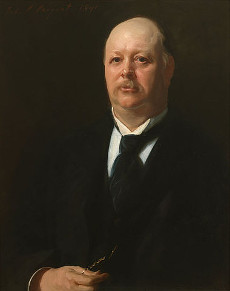
Until 1890, the minority party in the U.S. House of Representatives could block a vote by “disappearing”; they’d demand a roll call, remain silent when called upon, and then declare that too few members were “present” for the House to conduct its business.
To incoming speaker Thomas Brackett Reed this was a “tyranny of the minority,” and on Jan. 28 he resolved to break it. When Democrats demanded a roll call and refused to answer to their names, Reed marked them present anyway; when Kentucky representative James B. McCreary objected, Reed said sweetly, “The Chair is making a statement of fact that the gentleman from Kentucky is present. Does he deny it?”
There followed a sort of ontological shooting gallery. Democrats hid under their desks and behind screens to avoid being observed to exist. When they tried to flee the chamber entirely, Reed ordered the doors locked, which started a scramble to get out before the next vote. Representative Kilgore of Texas had to kick open a locked door to escape. Amid the howled objections, Confederate general “Fighting Joe” Wheeler came down from the rear “leaping from desk to desk as an ibex leaps from crag to crag,” and one unnamed Texas Democrat “sat in his seat significantly whetting a bowie knife on his boot.” Finally the Republicans mustered a majority even with the Democrats entirely absent, and the battle was over: Reed’s new rules were adopted on February 14.
Throughout all this Reed had seemed imperturbable, “serene as a summer morning.” He told a friend later that he had made up his mind what he would do if the House did not support him. “I would simply have left the Chair and resigned the Speakership and my seat in Congress,” he said. “I had made up my mind that if political life consisted in sitting helplessly in the Speaker’s Chair and seeing the majority helpless to pass legislation, I had had enough of it and was ready to step down and out.”
(From Barbara Tuchman’s The Proud Tower.) (Thanks, Zach.)
